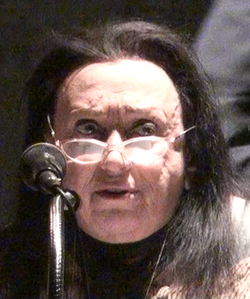Judith Malina
| Judith Malina | |
|---|---|

Malina reading at the 2011 Anarchy Art Festival
|
|
| Born |
June 4, 1926 Kiel, Prussia, Germany |
| Died | April 10, 2015 (aged 88) Englewood, New Jersey, U.S. |
| Cause of death | Lung disease |
| Citizenship | US |
| Education | The New School for Social Research |
| Occupation | Actor, director, writer |
| Known for | Co-founding The Living Theatre |
| Spouse(s) |
|
| Signature | |
 |
|
Judith Malina (June 4, 1926 – April 10, 2015) was a German-born American theater and film actress, writer and director. With her husband, Julian Beck, Malina co-founded The Living Theatre, a radical political theatre troupe that rose to prominence in New York City and Paris during the 1950s and 60s.
Malina was born in Kiel, Germany, the daughter of Jewish parents: her mother, Rosel (née Zamora), was a former actress, and her father, Max Malina, a rabbi in the Conservative denomination. In 1929 at the age of three, she immigrated with her parents to New York City.
Her parents helped her see how important political theatre was, as her father was trying to warn people of the Nazi menace.
Except for long tours, she lived in New York City until her move to the Lillian Booth Actors Home in Englewood, New Jersey. Interested in acting from an early age, she began attending the New School for Social Research in 1945 to study theatre under Erwin Piscator. Malina was greatly influenced by Piscator's philosophy of theatre which was similar to Bertolt Brecht's principles of "epic theatre" but went further in departing from traditional narrative forms. Piscator saw theatre as a form of political communication or agitprop (“Theatre interests me only when it is a matter of interest to society.”); Malina, unlike Piscator, was committed to nonviolence and anarchism.
In 1963 they had to close the Living Theatre because of IRS charges (later proved false) of tax problems, and Malina and Beck were convicted of contempt of court, in part because Judith defended Julian wearing the garb of Portia from The Merchant of Venice – and tried to use a similar argument. They received a five-year suspended sentence, and decided to leave the U.S. The company spent the next five years touring in Europe and creating increasingly radical works, culminating in Paradise Now. They returned to the US in 1968 to present their new work. In her book The Enormous Despair (1972), part of her series of published diaries, Malina expressed the sense of danger and unfamiliarity she felt on returning to the U.S. in the midst of the social upheavals of the late 1960s.
...
Wikipedia
